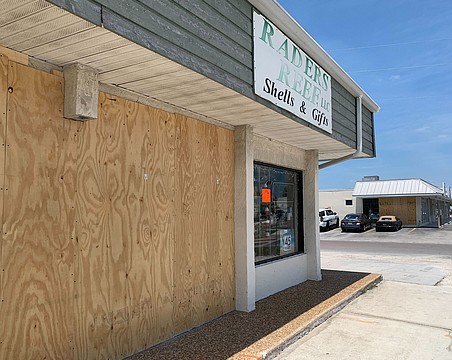Tampa to Baghdad
By David R. Corder
Associate Editor
Last month an explosion rocked the officersi billets at Camp Victory, the U.S. Army base at the northern edge of Iraqis Baghdad International Airport. A 152mm rocket, fired by Iraqi guerrillas, killed two soldiers and wounded several others.
About 20 feet away, the force of the explosion tossed 1st Lt. Stanley L. Martin off his bunk and onto the floor. All around him light bulbs shattered. Darkness enveloped him.
Martin, dazed, regained his senses and rushed to help others. It mattered not that glass shards punctured and the heat blistered the soles of his feet. Adrenaline masked the pain, at first. Medics later diagnosed him as suffering from a concussion.
It was an experience quite different from the routine Martin, 34, enjoyed only months ago as a commercial litigator in the Tampa office of Phelps Dunbar LLP. In April, the Army assigned the reserve officer for a year to its Trial Defense Service (TDS), the unit of Judge Advocate General (JAG) attorneys that represents soldiers accused of violating the Uniform Code of Military Justice.
The assignment thrust Martin into the unfamiliar glare of the public spotlight. He was appointed to represent Army Spc. Jeremy Sivits, who recently pleaded guilty to charges of mistreating Iraqi detainees at the notorious Baghdad Central Correctional Facility at Abu Ghraib. Major U.S. news organizations o The New York Times, The Washington Post and USA Today o frequently mentioned Martinis name in news reports about the Sivitsi prosecution.
Army Capt. Robert L. Shuck, then the senior defense counsel at the TDS field office in Iraq, assigned Martin to Sivitsi defense. He explained why in a recent e-mail to Larry Ingram, Phelps Dunbaris Tampa managing partner and Martinis supervisor.
iAs you must already know, (Martin) is an extremely gifted attorney,i Shuck wrote. iDespite little military justice background, frequent rocket and mortar attacks on our base, and austere practice conditions, Stan quickly became my best litigator out of five officers. Remarkably, soldiers from other bases in Baghdad started to ask me to assign Stan to their cases.i
Ingram wasnit surprised by the praise. He told Shuck: iWe are all very proud of his service and canit wait to get him back.i
Circuitous route
Martinis father, Stanley, and both of his grandfathers served in the U.S. armed forces.
And as for law, well, he says: iMy mother, Cindy, quit winning arguments with me when I was 10 years old. So I thought that I would make a pretty decent lawyer.i
In 1989, Martin graduated from Seffneris Armwood High School. He enlisted in the Army and served as a soldier until a knee injury forced his discharge. He returned home, began classes at Hillsborough Community College and then transferred to the University of South Florida, where he earned a bacheloris degree in 1996.
While in college, Martin planned on a return to military life. He wanted to be a pilot. In the meantime, he met his wife, Sarah. She encouraged him to enroll at the University of Florida Levin College of Law, where he earned a law degree in 1999.
iWe just laughed on the phone the other day about how I went to law school like she wanted, instead of joining the Army, and how I ended up in Iraq as a soldier and a lawyer,i he says. iSo much for the normal life she had in mind.i
After law school, Martin practiced in the St. Petersburg office of Ruden McClosky Smith Schuster & Russell PA. Later he went to work at Phelps Dunbar. Then came a day of infamy o Sept. 11, 2001. The devastation in New York, Washington, D.C. and Pennsylvania moved him. Martin wanted to apply for an Army Reservesi commission. He explained his feelings to Ingram, who offered his support.
Martinis commitment to his nation inspired the Phelps Dunbar management so much the firm agreed to pay him the difference between his legal salary and his military pay.
iPhelps Dunbar is a remarkable law firm that is completely committed to supporting the troops over here,i Martin says. iObviously, the disparity in pay is significant. Unlike many employers with employees who are reservists, Phelps Dunbar has never asked me to give an interview or speak publicly about the firmis support. They just do it because they think it is the right thing to do.i
That means much to Martin, who acknowledges he worried about the welfare of his wife and 3-year-old son, Zack.
iPhelps Dunbaris generosity and support of me as a firm attorney and as a soldier has really helped my wife and my son not feel the financial impact many reservistsi families experience when a soldier is called to active duty,i Martin says.
Anything but typical
Each day Martin ventures from the relative security of Camp Victory to a hostile environment. It is anything but typical work. He frequently travels in armored vehicles or Blackhawk helicopters to interview witnesses or inspect crime scenes.
iI might be in trial or in an alley in downtown Baghdad on a foot patrol to investigate a crime scene, while pulling security in doorways and looking at rooftops for snipers,i he says. iMost days Iim amazed that the government actually pays me to do things such as flying rooftop level over downtown Baghdad in a Blackhawk with the doors wide open and the toes of my boots hanging over the side of the aircraft.i
If that sounds dangerous, Martin acknowledges it is. He doesnit do it out of boredom, either.
iMany civilian lawyers would be surprised at the primary role of all JAGs over here,i he says. iTheyire war fighters. For example, on a convoy, a JAG in a HMMWV (high mobility multipurpose wheeled vehicle) is not a military lawyer but 25% of that vehicleis firepower. In a firefight, the JAG is expected to assume the role of driver, gunner or commander if necessary.
iThat requires technical proficiency as a soldier and as a rifleman,i he adds. iThe best and brightest lawyer in the Army is worse than useless if he or she cannot return fire, react properly to an ambush or remain in control while under fire.i
The past seven months has given Martin a unique outlook on his work as a civilian litigator. He wonit take his life for granted when he returns to the Tampa Bay area.
iProfessionals, lawyers especially, often use terms such as egoing to wari to describe taking a tough approach and ewar roomi to describe a room used for brain storming and strategizing,i he says. iI think that if more of them saw what really occurs in war they would be less likely to use those terms so casually.i
Thomas M. Donegan Jr., vice president and assistant general counsel at Tampa-based Brown & Brown Inc., met Martin two years ago through mutual friends. They frequently correspond via e-mail mostly to talk about their common interest o University of Florida football.
iThereis a distinct presence about him,i Donegan says. iHeis got a good sense of humor but carries himself with a confidence thatis impressive.i
It didnit surprise Donegan to learn of Martinis reaction to last monthis rocket attack. iI wonder how many of us would have the steel in us to respond if we were called upon to do so?i he says. iHeis really just an impressive guy.i
Martin says he only did his duty. He sees nothing heroic in his deeds.
iI cannot stress how trivial my injuries were compared to several others in that incident,i he says. iTechnically, I probably qualified (for a Purple Heart medal) although I would not be able to look myself in the mirror if I was awarded one for those minor injuries, and I would never request one. Many soldiers here, and in other wars, have been awarded the Purple Heart for fatal injuries and for injuries that have resulted in significant loss of limb. Mine were very minor.i
High-profile work
Since being appointed to represent Sivits, Martin has shunned the news media because Sivitsi commanding general hasnit taken final action in the case.
In published reports, however, military law experts speculate Martin negotiated a pretty good deal for Sivits even though a military judge sentenced him to the maximum allowable under military law o one yearis confinement, a bad conduct discharge and reduction in rank to private.
Experts suggest Martin may have positioned Sivits for a possible reprieve in exchange for his testimony against other soldiers accused of mistreating prisoners at the Baghdad correctional facility.
With the Sivitsi case near completion, Martin now focuses on what may be his greatest challenge as a military lawyer.
Martin represents Staff Sgt. Johnny Horne, 30, one of two U.S. soldiers charged with murder in what some Army officials describe as the mercy killing of a critically injured Iraqi boy. The murder trial begins Friday, Dec. 10. If convicted, the soldiers face the death penalty.
Despite the pressures of such a job, Martin takes a pragmatic view about trial preparation. iActually, a trial is pretty much a trial, regardless of the law being litigated,i he says.
But there is no doubt in Ingramis opinion that Martinis military clients have the best representation possible.
iThereis no question theyire getting the finest representation available,i Ingram says. iHeis a tenacious, skilled litigation attorney. Having said that I canit wait to get him back, because nothing thatis ever going to happen in our practice is going to scare him. Weire very proud of Stan.i





